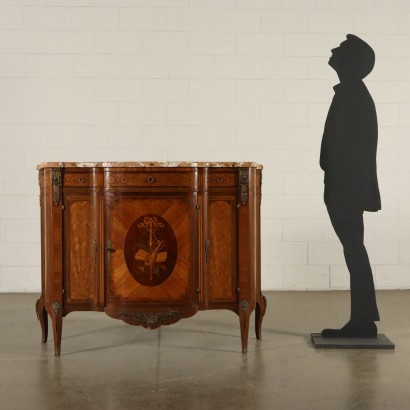Cupboard Napoleon III Marble Top Bronze France 20th Century
Features
Age: 20th Century / 1901 - 2000
Origin: France
Main essence: Maple , Brazilian Rosewood , Various Wood Essences , Mahogany
Description
Serpentine cupboard with single door. The two panels next to the central door can be opened. Three drawers aligned under the top. Richly inlaid with bronzes. Marble top. Manufactured in France, early 20th century.
Product Condition:
Fair condition. Wear consistent with age and use.
Dimensions (cm):
Height: 103
Width: 131
Depth: 46
Additional Information
Age: 20th Century / 1901 - 2000
20th Century / 1901 - 2000 Main essence:
Maple
Hard, light wood used for inlays. It grows mainly in Austria, but it is widespread throughout the northern hemisphere, from Japan to North America, passing through China and Europe. It is one of the lightest woods ever, tending to white, it is similar to lime or birch wood. The briar is used in the production of ancient secretaires .
Brazilian Rosewood
It is a hard, light blond wood, but with strong red and pinkish veins, which is obtained from tropical trees similar to rosewood. Its veins are reminiscent of striped tulips, which is why it is called tulipwood in English-speaking areas. It is used for inlays, often combined with bois de violette. In the 1700s and 1800s it was highly appreciated and used in France and England for precious veneers. It gives off scent for decades if not centuries after curing.
Various Wood Essences
Mahogany
It is one of the most precious and sought-after woods in cabinet making. It was discovered in Central America around 1600 and began to be imported to England in the 1700s. Much appreciated for its hardness and indestructibility, it became widespread following the blocking of walnut exports from France in 1720 and the consequent elimination of English import duties on mahogany from the colonies in America and India. The most valuable version comes from Cuba, but it became very expensive. At the end of the 18th century it began to be used also in France in Louis XVI, Directory and Empire furniture, its diffusion declined starting from when Napoleon, in 1810, forbade its import. It was generally used in the manufacture of elegant furniture, due to its characteristics and beautiful grain. 

























